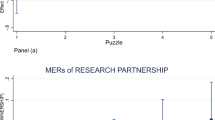Abstract
The objective of this study was to investigate the effects of technology commercialization on researcher practice and productivity at U.S. universities. Using data drawn from licensing contract documents and databases of university-industry linkages and faculty research output, the study findings suggest that the common practice of licensing technologies exclusively to singular firms may have a dampening effect on faculty inventor propensity to conduct published research and to collaborate with others on research. Furthermore, faculty who are more actively engaged in patenting may be less likely to collaborate with outsiders on research while faculty at public universities may experience particularly strong norms to engage in commercialization vis-à-vis traditional routes to research dissemination. These circumstances appear to be hindering innovation via the traditional mechanisms (research publication and collaboration), questioning the success of policymaking to date for the purpose of speeding the movement of research from the lab bench to society.

Similar content being viewed by others
References
Angell, M. (2000). Is academic medicine for sale? The New England Journal of Medicine, 342, 1516–1518.
Angell, M. & Relman, A. S. (2002). Patents, profits, & American medicine: Conflicts of interest in the testing & marketing of a new drug. Daedalus, 131, 1-2-111.
Argyres, N. S., & Liebeskind, J. P. (1998). Privatizing the intellectual commons: Universities and commercialization of biotechnology. Journal of Economic Behavior & Organization, 35, 427–454.
Association of American Medical Colleges and Consortium of Eleven Universities. (2007). In the public interest: Nine points to consider in licensing university technology. Palo Alto: Stanford University.
Barton, R. (2002). Patents, genomics, research and diagnostics. Academic Medicine, 77, 2039–2047.
Cho, M. K., Illangasekare, S., Weaver, M. A., Leonard, D. G., & Merz, J. F. (2003). Effects of patents and licenses on the provision of clinical genetic testing services. Journal of Molecular Diagnostics, 5(1), 3–8.
Cohen, W. M., Nelson, R. R., & Walsh, J. P. (2002). Links and Impacts: The Influence of Public Research on Industrial R&D. Management Science, 48(1), 1–23.
Eisenberg, R. S. (2000). Genomics in the public domain: Strategy and policy. Nature Reviews Genetics, 1, 70–74.
Eisenhardt, K. (1985). Control: Organizational and economic approaches. Management Science, 31, 134–149.
Etzkowitz, H. (1998). The norms of entrepreneurial science: Cognitive effects of the new university-industry linkages. Research Policy, 27, 823–833.
Etzkowitz, H., Webster, A., & Healey, P. (1998). Capitalizing knowledge. Albany, NY: SUNY Press.
Feller, I. (1990). Universities as engines of R&D-based economic growth: They think they can. Research Policy, 19, 335–348.
Harhoff, D., Scherer, F. M., & Vopel, K. (2003). Citations, family size, opposition, and the value of patent rights. Research Policy, 32, 1343–1365.
Heller, M. A., & Eisenberg, R. S. (1998). Can patents deter innovation? The anticommons in biomedical research. Science, 280, 698–701.
Henry, M. R., Cho, M. K., Weaver, M. A., & Merz, J. F. (2002). DNA patenting and licensing. Science, 297, 1279.
Hessels, L. K., & van Lente, H. (2008). Re-thinking new knowledge production: A literature review and a research agenda. Research Policy, 37, 740–760.
Lerner, J. (1994). The importance of patent scope: An empirical analysis. RAND Journal of Economics, 25, 319–333.
Mitroff, I. I. (1974). Norms and Counter-Norms in a Select Group of the Apollo Moon Scientists: A Case Study of the Ambivalence of Scientists. American Sociological Review, 39, 579–595.
Murray, F. (2004). The role of academic inventors in entrepreneurial firms: Sharing the laboratory life. Research Policy, 33, 643–659.
Murray, F., & Stern, S. (2007). Do formal intellectual property rights hinder the free flow of scientific knowledge? An empirical test of the anti-commons hypothesis. Journal of Economic Behavior & Organization, 63, 648–687.
Narin, F., Hamilton, K. S., & Olivastro, D. (1997). The increasing linkage between U.S. technology and public science. Research Policy, 26, 317–330.
O’Neill, H., Pouder, R. W., & Buchholtz, A. K. (1998). Patterns in the diffusion of strategies across organizations: Insights from the innovation diffusion literature. Academy of Management Review, 23, 98–115.
Powers, J. (2003). Commercializing academic research: Resource effects on performance of university technology transfer. Journal of Higher Education, 74(1), 26–50.
Powers, J. (2004a). Inside the IPO black box: University licensing to companies that go public. AUTM Journal, 76(1), 11–28.
Powers, J. (2004b). R&D funding sources and university technology transfer: What is stimulating universities to be more entrepreneurial? Research in Higher Education, 45, 1–23.
Rai, A. K., & Eisenberg, R. S. (2003). Bayh-Dole reform and the progress of biomedicine. American Scientist, 91, 52–59.
Rogers, E. M. (1983). Diffusion of innovations (3rd ed.). New York: Free Press.
Rosenberg, N., & Nelson, R. R. (1994). American universities and technical advances in industry. Research Policy, 23, 323–348.
Schissel, A., Merz, J. F., & Cho, M. K. (1999). Survey confirms fears about licensing of genetic tests. Nature, 402, 118.
Shane, S. (2001). Technological opportunities and new firm creation. Management Science, 47, 205–220.
Siegel, D. S., Waldman, D. A., Atwater, L. E., & Link, A. N. (2004). Toward a model of the effective transfer of scientific knowledge from academicians to practitioners: Qualitative evidence from the commercialization of university technologies. Journal of Engineering and Technology Management, 21, 115–142.
Sine, W. D., Shane, S., & DiGregorio, D. (2003). The halo effect and technology licensing: The influence of institutional prestige on the licensing of university inventions. Management Science, 49, 478–496.
Slaughter, S., & Leslie, L. L. (1997). Academic capitalism—politics, policies, and the entrepreneurial university. Baltimore: Johns-Hopkins.
Thursby, J. M., & Thusby, M. C. (2004). Are faculty critical? Their role in university-industry licensing. Contemporary Economic Policy, 22, 162–178.
Tornquist, K. M., & Hoenack, S. A. (1996). Firm utilization of university scientific research. Research in Higher Education, 37, 509–534.
Author information
Authors and Affiliations
Corresponding author
Additional information
This research was supported by a grant 1-R03 H6003987-01 from the National Instiutes of Health.
Rights and permissions
About this article
Cite this article
Powers, J.B., Campbell, E.G. Technology Commercialization Effects on the Conduct of Research in Higher Education. Res High Educ 52, 245–260 (2011). https://doi.org/10.1007/s11162-010-9195-y
Received:
Published:
Issue Date:
DOI: https://doi.org/10.1007/s11162-010-9195-y




